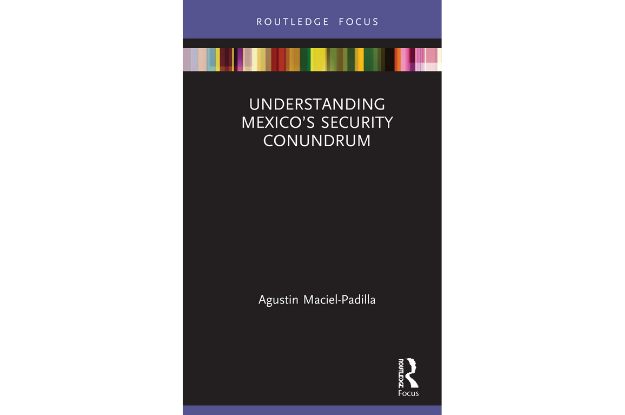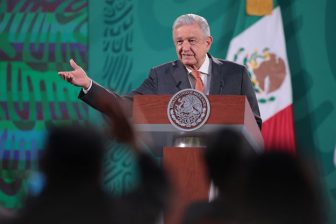Not so long ago, in response to political rhetoric in the United States, former Mexican president Vicente Fox was quoted as saying “Instead of building walls, we should be building bridges.” This can describe Mexico’s national challenges and frustrations on many fronts, whether they be in the spheres of water resources, security, trade or migration. Living next to the world’s most powerful country and largest economy often means that most Mexican foreign policy actions and decisions necessarily gravitate around the relationship with the neighbor to the north. It is in this context that Agustin Maciel-Padilla has come forth proposing some additional thinking in Understanding Mexico’s Security Conundrum.
Anyone who paid attention to international news prior to the COVID-19 pandemic is also familiar with the security problem facing Mexico, namely the extreme levels of violence and rampant corruption accompanying the country’s major drug cartels’ activities. Much has been written about these dynamics, including some nuanced and in-depth work by George Mason University’s Guadalupe Correa-Cabrera on the cartels’ move into other areas of business outside of illicit narcotics, and the University of Chicago’s Benjamin Lessing’s focus on the calculations cartels make before deciding to carry out offensive armed attacks on police and military forces.
As in the United States, many policing responsibilities in Mexico fall to its 32 states and more than 2,000 municipal governments. However, a lack of local institutional capacity, corruption and the cartels’ constant threats of violence against mayors have severely undermined local governance and national security. In this vacuum, consecutive Mexican administrations have used the army and marines to go after cartel kingpins with varying degrees of success. Such missions have presented numerous challenges to the military as they have been taken out of their comfort zones of disaster response and the manual eradication of marijuana and opium poppies. Mexico’s current president Andrés Manuel López Obrador took the initiative to activate an intermediate force called the National Guard. The Guard draws on a mix of civilian and military capabilities and personnel to confront the cartels and public security more generally. In response to pressure from the Trump administration, Mexico’s National Guard has also been deployed to enhance border control and thwart illegal migration.
To say the least, much of the scholarship and writing on Mexico’s challenges in recent years have understandably focused largely on the “drugs and thugs” framing and narrative. Maciel-Padilla combines a unique academic background obtained from the department of War Studies at King’s College in the UK and professional postings in the Mexican foreign ministry, including stints related to consular and border affairs in El Paso, Texas and in Belize. In Understanding Mexico’s Security Conundrum, his primary thesis is that for Mexico to overcome its current challenges it needs to move beyond a criminological approach and incorporate plans derived from international relations, geopolitics and strategic studies. Mexico’s foreign policy stance has long been associated with a doctrine of non-interference. Despite the softening of this stance in recent decades, vis-à-vis the U.S.-funded Plan Mérida, the López Obrador administration has sought to return to a more traditional approach to diplomacy that stays out of the affairs of other countries while demanding they sidestep Mexico’s internal business.
Maciel-Padilla’s primary critique is that Mexico’s institutions spend too much time navel-gazing at their immediate, internal problems at the expense of developing a more comprehensive view of the external environment. This is in part because Mexico’s own laws and organizational structures conflate national security with related concepts of public and internal security. At the same time, Maciel-Padilla expresses frustration that recent reforms to the national intelligence service, restructured and renamed as National Intelligence Center in 2019, largely reinforce this inward-focused paradigm. For this reason, he says, Mexican public and foreign policies are insufficient to address a range of issues affecting the country. Those issues include the lack of governance in the Northern Triangle of Central America and its spillover effects, the deterioration of numerous points of long-held understanding with the United States, the rise of China, the impact of climate change and the evolution in energy markets, as well as the whole gamut of technological issues related to cyber, artificial intelligence and the quantum computing revolution.
Among Maciel-Padilla’s most interesting policy recommendations is the creation of a new cross-disciplinary Mexican intelligence service focused on analyzing developments in the external environment, perhaps modeled in part on the British intelligence service MI6 without the clandestine espionage component. This might not be a bad idea in an age where most governments struggle to make sense and policy decisions out of an overabundant data ecosystem. The conundrum is making coherent strategy when globalization pulls in one direction and national sentiment move in another.
—
Godnick is a professor of practice with the William J. Perry Center for Hemispheric Defense Studies at the National Defense University in Washington, D.C. The views expressed here are his own.







